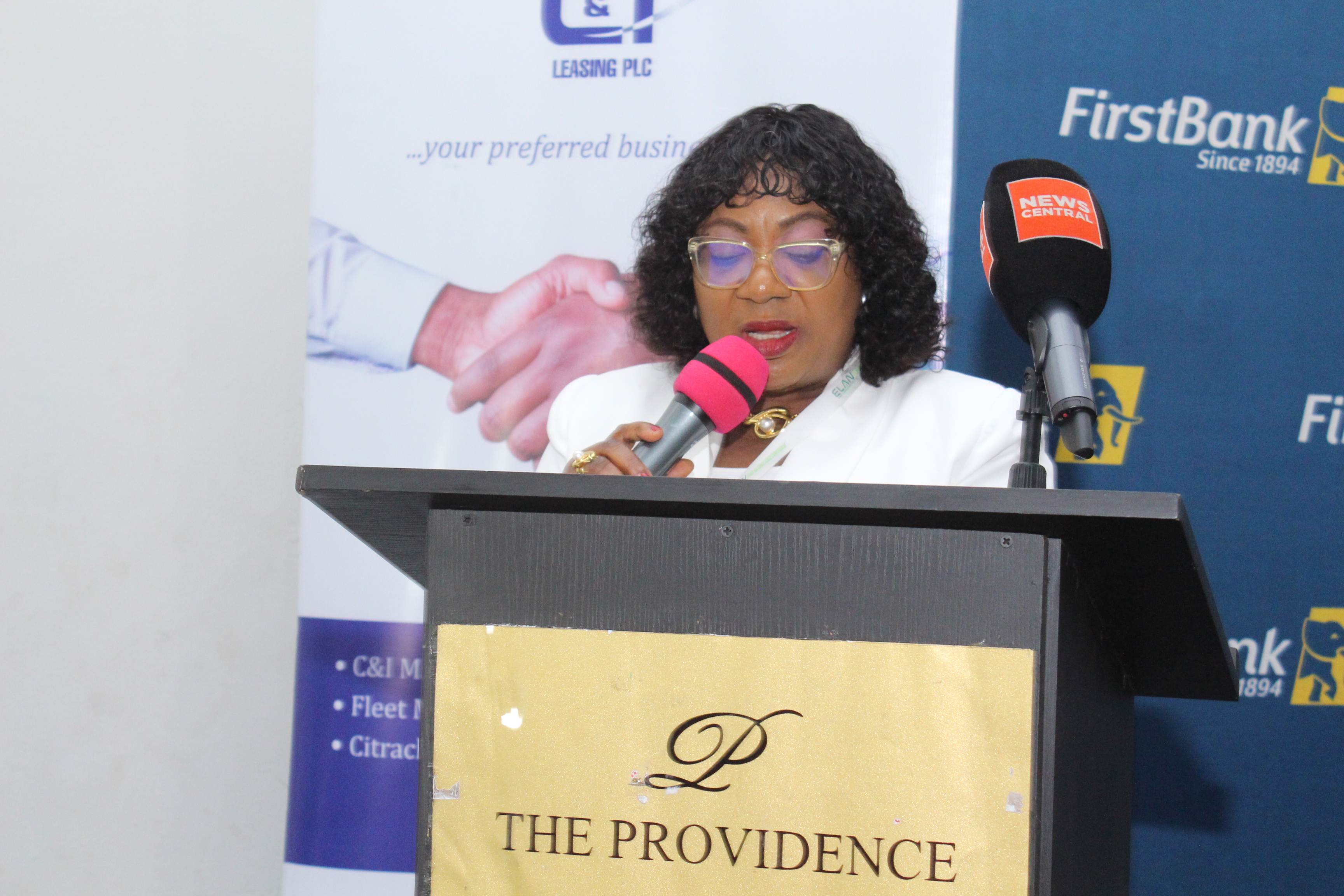
WELCOME ADDRESS BY EHIGIAMUSOE ELIZABETH NGOZI (MRS), CHAIRMAN, BOARD OF DIRECTORS, EQUIPMENT LEASING ASSOCIATION OF NIGERIA (ELAN) AT THE 23RD NATIONAL LEASE CONFERENCE HELD ON THURSDAY, 13TH NOVEMBER 2025 AT PROVIDENCE HOTEL GRA, IKEJA, LAGOS.
Distinguished Special Guests
Esteemed Guest Speakers and Panellists
Directors and Members of ELAN
Distinguished Partners
Gentlemen of the Press
Ladies and Gentlemen,
.
It is both an honour and a privilege, on behalf of the Board and Members of the Equipment Leasing Association of Nigeria (ELAN), to warmly welcome you to the 23rd National Lease Conference. We are delighted to have with us today a distinguished gathering of stakeholders — regulators, financiers, lessors, lessees, development partners, and other reputable corporate institutions, all united by one common goal: to strengthen the foundation of equipment leasing as a vital instrument for Nigeria’s economic growth and development, while fostering collaboration and networking among industry stakeholders.
Permit me to begin by acknowledging our special guests, esteemed guest speakers and panellists, the Registrar of the Equipment Leasing Registration Authority (ELRA), Directors of ELAN here present, Managing Directors and top executives of ELAN member companies, our partners, and gentlemen of the press. Your presence today reflects your commitment to advancing the growth, innovation, and sustainability of leasing in Nigeria, and indeed, the Nigerian economy.
The Annual National Lease Conference is the largest gathering of stakeholders in the Nigerian leasing industry. It has become a major platform for discussing pertinent issues affecting the development of the leasing industry and the economy at large — exploring opportunities, promoting business networking, and deepening stakeholders’ engagement. Over the years, these conversations have brought significant visibility to the leasing industry, strengthened collaboration with stakeholders, and shaped policy direction — including the enactment of the Equipment Leasing Act 2015 and the issuance of the Guidelines on Tax Implications of Leasing by the FIRS in 2010.
The theme of this year’s conference, “Enhancing Growth and Sustainability in the Nigerian Equipment Leasing Industry,” is both timely and visionary. It underscores our shared commitment to building a leasing sector that not only grows in size and reach but also stands resilient, responsible, and sustainable, making leasing a vital instrument for stimulating investment, empowering businesses, and driving national development.
The Nigerian economy, after several years of turbulence, is showing cautious signs of recovery. According to the National Bureau of Statistics, real GDP grew by 4.23% in the second quarter of 2025, compared to 3.48% in the same period of 2024. The non-oil sector — our main driver of growth- expanded by 3.64%, while the oil sector rebounded strongly by over 20% due to improved production and favourable base effects. These figures reflect not just a return to growth but a gradual rebalancing of our economy.
Government efforts to stabilise the macroeconomic environment and improve fiscal management are beginning to yield results. Inflation, though still high, has shown signs of easing, declining from over 24% in March to 18.02 % in September, the lowest in recent years.
Together, these trends point to an economy in genuine recovery — one that must now be anchored on real-sector expansion, investment in productive assets, and enterprise development. This is precisely where equipment leasing plays a vital role, serving as a bridge between capital needs and productive growth.
Globally, equipment leasing has long been established as a creative financing alternative that enhances capital formation and supports economic growth. It represents about 20% of total investment in equipment and contributes roughly 1.5% to global GDP. The global leasing industry continues to play a pivotal role in providing access to productive equipment, helping businesses of all sizes to thrive, and supporting governments’ developmental initiatives. It contributes significantly to job creation, technological advancement, and international trade. The beauty of leasing lies in the multiplicity of benefits it delivers to those who choose to lease.
Over the years, leasing has continued to play a strategic role in promoting economic growth and supporting businesses across Nigeria’s productive sectors. The industry recorded an impressive 23.2% growth in 2024, with the value of outstanding leases reaching ₦5.16 trillion, compared to ₦4.19 trillion in 2023. New lease contracts in the same year stood at approximately ₦973 billion, while cumulative leasing volume over the past decade is estimated at ₦24.6 trillion. These figures demonstrate the resilience and capacity of leasing to bridge Nigeria’s investment gap and stimulate asset acquisition across sectors.
Leasing today underpins critical segments of our economy — oil and gas, transportation, manufacturing, telecommunications, healthcare, agriculture, and construction. It allows businesses to acquire modern machinery and equipment without the heavy burden of upfront capital, enabling them to preserve liquidity, improve efficiency, and remain competitive. For many micro, small, and medium enterprises, leasing has become a lifeline, offering access to assets that would otherwise remain beyond reach.
The overall essence of leasing is to enhance the planning, improvement, and development of any economy by building and supporting productive ventures. We therefore call on the Federal Government and indeed the states to utilise leasing in their various developmental initiatives aimed at bringing succour to the people. The leasing industry is willing to collaborate with the government at all levels and build a strong partnership with other stakeholders to achieve the set economic initiatives.
However, as we celebrate these achievements, we must also confront the challenges before us as an industry. Access to long-term and affordable funding remains a major constraint. The volatility of the exchange rate continues to affect imported equipment and lease pricing. Contract enforcement and asset recovery processes still pose difficulties, while awareness of leasing, particularly among MSMEs, remains limited, and the concern of taxation, especially in the areas of Value Added Tax (VAT) and Withholding Tax, persists and continues to weigh heavily on operators in the industry.
Furthermore, the global shift towards sustainability compels us to rethink how we operate. The future of leasing will be shaped by technology, digital transformation, and green finance. Leasing companies that embrace innovation, data-driven decision-making, and environmental responsibility will be best-positioned to thrive in the years ahead.
While the leasing industry will continue to thrive by sustaining its resilience amid prevailing challenges, it is imperative for all stakeholders to work together to ensure the sustained development and growth of the sector. The government, as a major stakeholder, must provide a favourable regulatory environment and establish supportive mechanisms—such as accessible funding windows to stimulate industry development.
The Equipment Leasing Registration Authority (ELRA), as the primary regulator, equally has a critical role to play. Through effective collaboration with industry practitioners, ELRA should ensure that the discharge of its mandate is more promotional than constraining, thereby fostering an environment that encourages innovation and growth.
In the same vein, lessors must stay ahead of economic trends by realigning strategies and embracing innovation to continually deliver value to customers while positioning their businesses for long-term growth. Those who strategically adopt this approach will be best equipped to thrive in the evolving equipment leasing landscape.
As the umbrella body for the leasing industry, ELAN remains steadfast in its commitment to guiding and creating platforms that facilitate the attainment of corporate objectives and serve the diverse interests of stakeholders. We will continue to promote best practices, advocate for a conducive operating environment, strengthen capacity building among practitioners, and engage effectively to address the challenges confronting our industry.
Indeed, our conversation today centres on how to consolidate past gains, overcome emerging challenges, and build a resilient and sustainable future for leasing in Nigeria. This conference provides a unique platform to reflect on current realities, review policies, engage with fresh ideas, and forge partnerships that will strengthen our industry and position it as a vital driver of Nigeria’s economic transformation. Through the sessions ahead, featuring an excellent lineup of speakers, panellists, and participants, we aim to generate practical insights that will help redefine the future of leasing in Nigeria.
Together, we can enhance the growth, sustainability, and relevance of leasing in Nigeria’s economic transformation journey.
On behalf of the Board, I express deep appreciation to our members, partners, sponsors, and participants who have continued to support the Association and this conference over the years. Your dedication and collaboration make our work possible and meaningful.
As we look ahead, let us remember that the story of leasing is, in many ways, the story of Nigeria’s resilience — of enterprise triumphing over adversity, of creativity finding expression even in challenging times. If we remain steadfast, innovative, and collaborative, leasing will not just support economic recovery — it will power Nigeria’s next phase of industrial growth and shared prosperity.
Once again, I warmly welcome you to the 23rd National Lease Conference. May our discussions be fruitful, and the outcomes of this gathering strengthen our collective resolve to build a more vibrant, sustainable, and inclusive leasing industry.
Thank you, and God bless.
Ehigiamusoe Elizabeth Ngozi (Mrs)
CHAIRMAN, BOARD OF DIRECTORS, ELAN

